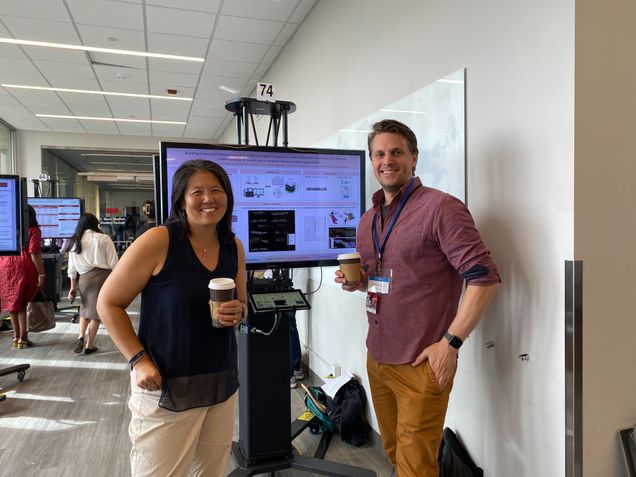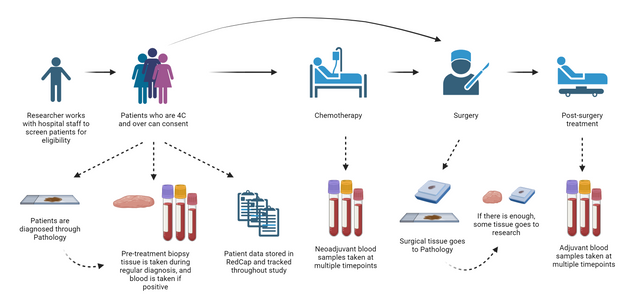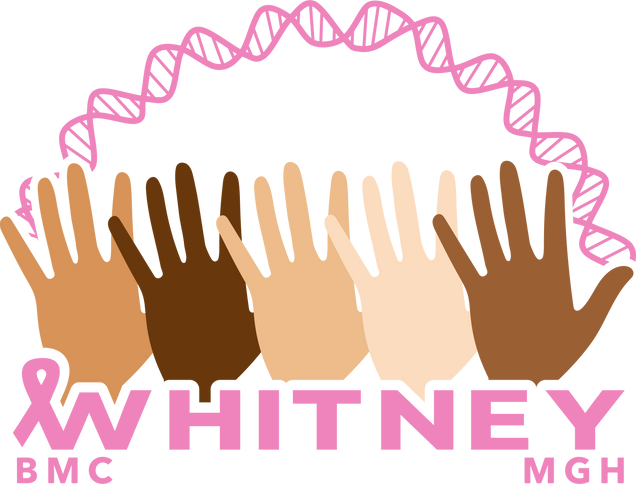Research
Our research focuses largely on:
- Breast Cancer
- Cancer Disparities
- Health Equity

Breast Cancer
For a general summary of what breast cancer is, you can refer to American Cancer Society’s one-pager or the NIH’s introductory module. You can also listen to Dr. Ko giving the 101 on breast cancer on this podcast.
For something a little more in-depth, check out Breast Cancer in Nature Reviews Disease Primers.
According to the NIH, 1 in 8 women in the US will be diagnosed with breast cancer at some point in their lifetime. Female breast cancer is the fourth leading cause of cancer death in the United States, with approximately 40,000 women dying each year. Overall, female breast cancer survival is good and continues to improve. However, Black women have a 40% higher mortality rate when compared to white women. Various factors such as those outlined below can play a large role in survival.
Low-income, racial and ethnic minorities have significantly higher mortality from breast cancer. The goal of our research is to try to eliminate health-care inequities, which is an important component for lessening the cancer burden on vulnerable patient populations. One approach to tackle this issue is to investigate why there is a critical disconnect between cancer discoveries and the delivery of cutting-edge cancer care to patients of all economic backgrounds.
Disparities in Breast Cancer
Breast cancer is a complex disease that is heterogeneous on the molecular level. Treatment and therapy depends on the subtype and stage of breast cancer. This alone can be a major point of disparity between patients, because Black women are more likely to have triple negative breast cancer. But other important factors to note when thinking about disparities include:
- Socioeconomic Status: Individuals with lower income or education levels may have limited access to healthcare, preventive services, legal advice, and treatment options.
- Geographic Location: Access to healthcare facilities, screening programs, and treatment can vary significantly by region.
- Healthcare Access: Barriers such as lack of insurance, transportation issues, and insufficient health literacy can prevent individuals from receiving timely screenings and treatments.
- Biological Factors: Genetic predispositions and biological differences such as tumor microenvironments and epigenetic mutations can influence how breast cancer develops and progresses.
- Lifestyle: Diet, nutrition, exercise, and substance use can all have significant impact on the development of cancer.
Inequities in Treatment
To further complicate the problem of breast cancer disparities are the inequities in treatment and access to treatment. Factors such as socioeconomic status, awareness, insurance coverage and financial issues, and living in underserved locations with no specialized treatment facilities prevent people from receiving timely treatment – early stage breast cancer is considered curable, but advanced disease is not, even if treatable with our current approaches. Biases in our systems and research also play a role in delivering effective treatment, or having patients follow through with the treatments they need:
- Healthcare System Bias: Implicit biases among healthcare providers can lead to differences in the quality of care offered to patients based on race, ethnicity, or socioeconomic status.
- Cultural and Linguistic Barriers: Patients from diverse backgrounds may face challenges related to language, cultural beliefs, or mistrust of the healthcare system, which can affect their willingness to seek and adhere to treatment.
- Clinical Trial Participation: Underrepresentation of minority groups in clinical trials has lead to a lack of data on how different populations respond to certain treatments, resulting in less tailored care.
Innovative Research Approaches

Our goal is to work with patients from underserved and understudied backgrounds and conduct cutting edge research using health, lifestyle, treatment data, and samples provided by these patients. See below for some of our current research.
Ongoing Projects

WHITNEY (Women’s Health Initiative in Triple Negative EquitY) Project
An NIH/NCI funded multifaceted, multidisciplinary project that focuses on triple negative breast cancer (TNBC; an especially aggressive form of cancer affecting Black women). Through WHITNEY we have been collaborating with the Ellison Lab at MGH and the Dries Lab at BU/BMC to understand the genomic profiles of each patient’s cancer and the microenvironment, reasons behind any resistance to treatment, and reasons for the racial inequities seen between different populations of women.
Optimal Treatment Study
What factors are associated with optimal treatment in breast cancer? We have created a database that contains breast cancer patients from BMC to 1) compare patients who had a delay in therapy to those without delay, and assess differences between these groups which may account for treatment delay, 2) among those who did not receive timely care, describe the factors that contributed to this delay in care 3) compare patients who completed treatment to those who did not, and assess the difference, and 4) assess breast cancer clinical outcomes beyond delays. This data will be correlated with archival tissue specimens to identify new markers and mutations that will inform breast cancer treatment and clinical outcomes. We are learning from the past to help the future.
Multidimensional Markers of Response and Resistance in advanced breast cancer: CDK4/6 Inhibitors (HR+/HER2-)
We are working in collaboration with Bristol Myers Squibb (BMS) to understand biomarkers in the setting of progression in hormone positive metastatic breast cancer. In metastatic ER+Her2- we have established first line treatments, however the optimal second line therapy is unknown. We aim to investigate biomarkers associated with progression in our unique patient population that could guide the development of new therapies or decisions on currently available therapeutic agents, including immunotherapies.
